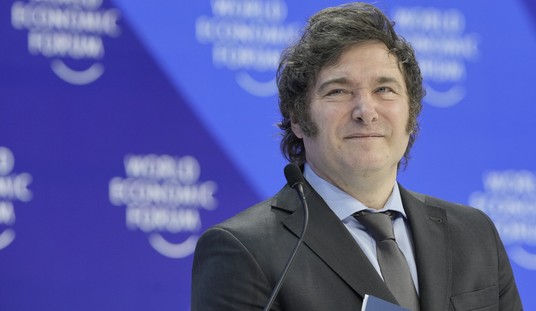It’s the “Politics of Envy” versus the “Politics of Resentment” in the 2012 election. President Obama has adopted the cover story of “fairness” to mask his drive to convince middle-class Americans that the real reason some people are better off than they are is not because they’re smarter, or work harder, or have a better idea to sell in the American marketplace, but because they cheat — climbing to the top on the backs of overworked, overtaxed, and underpaid Americans. The solution: Re-elect me and I’ll make the rich squeal like stuck pigs, rule by executive fiat, turn the EPA into an avenging Angel of Death for carbon emitters, and embrace the Muslim Brotherhood as, well, brothers.
It won’t solve anything but it will make a lot of people feel better in their misery.
The GOP counters by telling the middle class that the real problem is that there are a sizable number of citizens — including some of your neighbors — who are leeching off your tax dollars and getting a free ride through life. Health care, college tuition, food stamps, housing assistance, unemployment insurance — almost anything that Washington subsidizes is a waste of tax dollars and goes to undeserving reprobates (or illegal aliens) who are the cause of the gigantic growth in the size and scope of the federal government.
The solution: Elect a Republican and we’ll put poor kids to work after school as janitors, and make their parents dig ditches on a chain gang for their food stamps. We’ll build an electrified fence that the Mexican illegals will get a real charge out of, and then take us back to the good old days when everyone knew their place, gays were in the closet, abortions were in the back alley, God was in our science textbooks, and the federal government’s biggest worry was what to do about the inefficiency of the Post Office.
Missing from this unfolding debate are solutions on how to lift us out of this gigantic hole we’ve dug ourselves over the past 50 years. One might prefer to view this crisis as a 4 or 8 year problem, caused by one party or the other, and that if only the voters would give us another chance (Democrats) or throw the bum in the White House out (Republicans), the answer to your prayers would be at hand.
But this is nonsense. Both parties, liberals and conservatives, have contributed to the rapid growth in the federal government and the crushing debt with which we must now deal. Ask Ronald Reagan or either President Bush about shrinking the size of government or ask every Democratic Congress between 1948 and 1994 about prudence, responsible governance, and the efficacy of trying to foresee unintended consequences to their social engineering schemes. The Tea Party gets one thing very, very right: it is a culture in Washington that must be changed as much as the people who are part of it.
Meanwhile, we are treated to television spectacles that are designed largely to distract us from the real plight of the nation, eschewing truth and facts for fear mongering and character assassination. The fictional president Andrew Shepherd in the film The American President comes close to nailing it:
We have serious problems to solve, and we need serious people to solve them. And whatever your particular problem is, I promise you, Bob Rumson is not the least bit interested in solving it. He is interested in two things and two things only: making you afraid of it and telling you who’s to blame for it. That, ladies and gentlemen, is how you win elections. You gather a group of middle-aged, middle-class, middle-income voters who remember with longing an easier time, and you talk to them about family and American values and character.
The entertainment value — if there ever was any to this sideshow — has long since passed and we are left watching ghostly images on the tube of a president speaking before Congress while being held in thrall to the extremists of his party’s far left-wing base, while the extremists in the GOP are actually running things.
The evidence that the extremes of both parties have a stranglehold on power in Congress is fairly convincing. The center, for all intents and purposes, is gone. Almost all Democrats are liberals today and all Republicans are conservatives.
According to the political scientists Keith T. Poole and Howard Rosenthal, who have devised a widely used system to measure the ideology of members of Congress, when Obama took office there was no ideological overlap between the two parties. In the House, the most conservative Democrat, Bobby Bright, of Alabama, was farther to the left than the most liberal Republican, Joseph Cao, of Louisiana. The same was true in the Senate, where the most conservative Democrat, Ben Nelson, of Nebraska, was farther to the left than the most liberal Republican, Olympia Snowe, of Maine. According to Poole and Rosenthal’s data, both the House and the Senate are more polarized today than at any time since the eighteen-nineties.
It isn’t just polarization that has afflicted Washington. It is ideological extremism that is largely to blame for the inaction of Congress in the face of the worst economic crisis since the Great Depression — what one scholar who has studied the problem refers to as “asymmetrical polarization.”
The Republican Party has drifted much farther to the right than the Democratic Party has drifted to the left. Jacob Hacker, a professor at Yale, whose 2006 book, “Off Center,” documented this trend, told me, citing Poole and Rosenthal’s data on congressional voting records, that, since 1975, “Senate Republicans moved roughly twice as far to the right as Senate Democrats moved to the left” and “House Republicans moved roughly six times as far to the right as House Democrats moved to the left.” In other words, the story of the past few decades is asymmetric polarization.
The use of 1975 as a baseline is a little strange. If Professor Hacker had used the year 1972 or even 1974 to plot his graph, he would have found a huge shift among Democrats to the far left as the ’75 “Watergate babies” — almost universally “New Left” liberals who replaced more moderate or conservative Democrats — would have substantially evened the gap between Democrats and the GOP in the House.
No matter. The point is made. For a large number of conservatives and many liberals who are being taunted with the epithet “RINO” or “DINO,” the fact remains that they have not left their party. Their party has left them. Those who can’t stomach the extremism, the obstructionism, the radicalism of the neo-liberals and Tea Party conservatives who both seek to hammer each other into the ground on a daily basis are largely left on the outside, viewing the slow-motion train wreck that politics has become with a feeling of abject helplessness.
It’s not a question of “moderates” not holding power. One can be liberal or conservative and be pragmatic enough to work with the other side on the big issues of the day. The problem is, pragmatism is dead — killed by the excessively ideological base of both parties who view compromise as treason, and comity as cowardice. Both sides are so besotted with a warped and tangled view of each other that they occasionally — unintentionally — provide comic relief for our political culture.
The debt ceiling deal reached by President Obama and Speaker Boehner is one such example of a mirthful interlude. Both sides screamed bloody murder that their guy had botched it and had been taken by the other. It would do no good to point out that it would have been impossible for both sides to be “taken” on any one deal, so one side has to be in error. Guessing which one means that you will be acknowledged a genius by 50% of the extremists from both parties.
This kind of idiocy aside, the lack of pragmatism in both parties means that even the formerly simple tasks of government become ideological mountains to climb. Back in the good old days when Congress was made up of sane crooks and charlatans, the president’s appointments were mostly pro-forma exercises in governance. Cabinet secretaries, undersecretaries, and assistant secretaries were supported (or at least, unopposed) by the opposition as a matter of course. The president was not begrudged the courtesy of being able to pick his own people. Judges — unless they were closet cases or rabid racists (and even then they were sometimes given a pass) — were confirmed by voice vote or desultory roll calls with few dissenting votes.
Today, both parties go to war over federal judges, undersecretaries, ambassadors, and other appointees as if the fate of the republic hung on whether an appointee was too far left or right. Democrats did it to Bush as much as Republicans have done it to Obama. The process is broken and the consequences are a hobbled government at all levels. Whatever efforts to achieve a pragmatic solution — such as the “Gang of 14” who came to an agreement in 2007 regarding some of President Bush’s judicial appointees — are derided by both sides, undermined, and then destroyed by partisan sniping.
If one defines pragmatism as viewing the world as it is, prioritizing what’s important, and recognizing the validity and good faith of the other side in order to work together to solve problems, then there is a gravestone somewhere on Capitol Hill that might read:
Here lies the remains of pragmatic politics. Killed by excessive ideology and rank partisanship. Survived by the American republic — but for how long, no one can say.










Join the conversation as a VIP Member